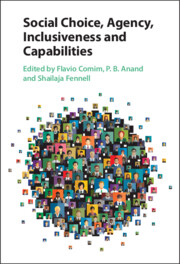59 results
Index
-
- Book:
- Social Choice, Agency, Inclusiveness and Capabilities
- Published online:
- 28 March 2024
- Print publication:
- 14 March 2024, pp 423-430
-
- Chapter
- Export citation
Part II - Inclusiveness, Social and Individual Agency
-
- Book:
- Social Choice, Agency, Inclusiveness and Capabilities
- Published online:
- 28 March 2024
- Print publication:
- 14 March 2024, pp 137-302
-
- Chapter
- Export citation
Contents
-
- Book:
- Social Choice, Agency, Inclusiveness and Capabilities
- Published online:
- 28 March 2024
- Print publication:
- 14 March 2024, pp v-vii
-
- Chapter
- Export citation

Social Choice, Agency, Inclusiveness and Capabilities
-
- Published online:
- 28 March 2024
- Print publication:
- 14 March 2024
Contributors
-
- Book:
- Social Choice, Agency, Inclusiveness and Capabilities
- Published online:
- 28 March 2024
- Print publication:
- 14 March 2024, pp x-xii
-
- Chapter
- Export citation
Preface and Acknowledgements
-
- Book:
- Social Choice, Agency, Inclusiveness and Capabilities
- Published online:
- 28 March 2024
- Print publication:
- 14 March 2024, pp xiii-xiv
-
- Chapter
- Export citation
Figures
-
- Book:
- Social Choice, Agency, Inclusiveness and Capabilities
- Published online:
- 28 March 2024
- Print publication:
- 14 March 2024, pp viii-viii
-
- Chapter
- Export citation
Copyright page
-
- Book:
- Social Choice, Agency, Inclusiveness and Capabilities
- Published online:
- 28 March 2024
- Print publication:
- 14 March 2024, pp iv-iv
-
- Chapter
- Export citation
3 - Beyond capabilities?
- from Part I - Social Choice and Capabilities
-
-
- Book:
- Social Choice, Agency, Inclusiveness and Capabilities
- Published online:
- 28 March 2024
- Print publication:
- 14 March 2024, pp 42-61
-
- Chapter
- Export citation
Part III - Social Choice and Capabilities in Action
-
- Book:
- Social Choice, Agency, Inclusiveness and Capabilities
- Published online:
- 28 March 2024
- Print publication:
- 14 March 2024, pp 303-422
-
- Chapter
- Export citation
1 - Introduction: social choice, agency, inclusiveness and capabilities
-
-
- Book:
- Social Choice, Agency, Inclusiveness and Capabilities
- Published online:
- 28 March 2024
- Print publication:
- 14 March 2024, pp 1-14
-
- Chapter
-
- You have access
- HTML
- Export citation
Tables
-
- Book:
- Social Choice, Agency, Inclusiveness and Capabilities
- Published online:
- 28 March 2024
- Print publication:
- 14 March 2024, pp ix-ix
-
- Chapter
- Export citation
Part I - Social Choice and Capabilities
-
- Book:
- Social Choice, Agency, Inclusiveness and Capabilities
- Published online:
- 28 March 2024
- Print publication:
- 14 March 2024, pp 15-136
-
- Chapter
- Export citation
3 - Public Goods and Public Spirit
- from Part I - Development Ethics
-
-
- Book:
- Agency and Democracy in Development Ethics
- Published online:
- 26 February 2019
- Print publication:
- 14 March 2019, pp 75-105
-
- Chapter
- Export citation
Contents
-
- Book:
- New Frontiers of the Capability Approach
- Published online:
- 08 October 2018
- Print publication:
- 25 October 2018, pp v-vii
-
- Chapter
- Export citation
1 - Introduction
-
-
- Book:
- New Frontiers of the Capability Approach
- Published online:
- 08 October 2018
- Print publication:
- 25 October 2018, pp 1-11
-
- Chapter
- Export citation
Part V - The Education Frontier
-
- Book:
- New Frontiers of the Capability Approach
- Published online:
- 08 October 2018
- Print publication:
- 25 October 2018, pp 547-642
-
- Chapter
- Export citation
Preface and Acknowledgements
-
- Book:
- New Frontiers of the Capability Approach
- Published online:
- 08 October 2018
- Print publication:
- 25 October 2018, pp xiv-xvi
-
- Chapter
- Export citation
Part II - The Operationalisation Frontier
-
- Book:
- New Frontiers of the Capability Approach
- Published online:
- 08 October 2018
- Print publication:
- 25 October 2018, pp 177-270
-
- Chapter
- Export citation
Part I - The Need for New Foundations
-
- Book:
- New Frontiers of the Capability Approach
- Published online:
- 08 October 2018
- Print publication:
- 25 October 2018, pp 51-176
-
- Chapter
- Export citation



